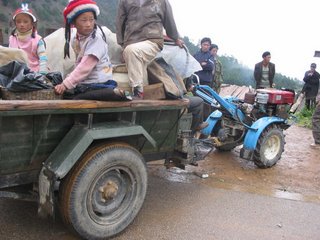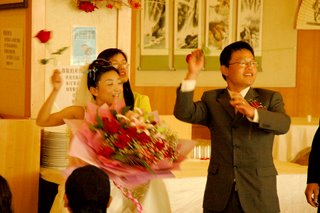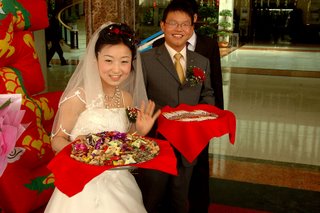Back to Basics

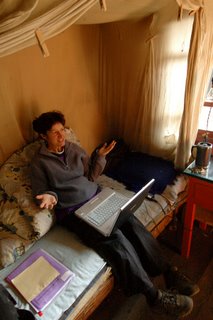
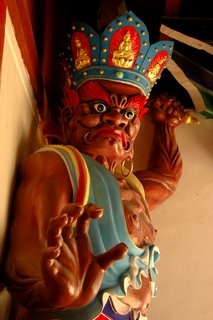

A laptop with a wireless connection is pretty much the perfect significant other, and these days I can't seem to go anywhere without it. In The People's Republic, mobile coverage is breath-taking, so, instead of fretting that I have too much work to do and can't get away on the weekend, I now just throw the office in my Macpac and walk out the door.
A few weeks back, Ken, Ellen, Bei and I spent the weekend at a Buddhist monastery up in the hills south of here, about 2 and1/2 hours away by bus and then mini-van. There were five elderly nuns, a few old men, and a couple of younger men who turned up for meals and then disappeared. My two friends being of scientific backgrounds sought assiduously to uncover the workings of the place and how the non-nuns fitted into the picture. Did they have families? apparently yes. Did they all live at the monastery? Unclear.
When we asked about staying the night I got the impression that guests were uncommon, let alone three foreigners and a child. But we were absorbed into this relaxed loose 'family' without any fuss. We all felt immediately at home. The atmosphere seemed to pervade us, and the places was big and rambling enough that we naturally dispersed in different directions. Ken disappeared for a walk up in the hills, while Ellen sat at a table on the verandah in the main courtyard reading and marking. Four and a half year old Bei did what she always does in restaurants, guesthouses, shops, homes, anywhere, and took charge of the domestic management as if she'd been there for years.
I initially settled into marking at a little low table in the corner of a deep concrete verandah located in the second smaller courtyard by the kitchen area, which consisted of a sink and a huge wok set in a tiled bench over a fire place. For a while the oldest of the old nuns crouched on the skinny bench beside me and made occasional comments in a local dialect.
Later in the evening I approached the woman whom I'd designated as top-nun. She spoke mandarin, was the only one dressed in a grey Buddhist nun-like outfit and seemed to be the spritual representative for the others in that she lit the candles, insense and did the praying at the main alter. I asked if there was a handy power point I could use. By this time most of the community was in a bedroom off the main verandah gathered around the TV and a bowl of burning coals. And soon I was settled in the room next door on the bed, tapping away very happily. Occasionally I'd look up at a few nuns sitting on the couch outside my doorway. Once I was beckoned to thread a needle for one of them, who wanted to patch up a sleeve on her blue Mao suit.
The photo of me was taken by Ken the next morning after breakfast. I'm expounding how one doesn't need anything else; it's all here. I' m full of golden bread which I'd been plied with further down the verandah at a little fire set in a hollow in the concrete. There's my indispensible insulated Kathmandu coffee plunger/mug on the table. I can hear Ellen and Bei still down at the fire, laughing and talking with the old men who adore watching Bei feed her Barbie doll, while Ellen suggests that maybe Barbie's had enough and Bei should start feeding herself.
In a few months my latest foreign friends will be going back to where they came from. It feels like they haven't long arrived. They will be the second pairof teachers I've farewelled. How odd to be in the position of the one waving goodbye instead of walking away. I'm about to sign on for another semester, maybe even two, which would bring me up to the three year mark...
Now mid-semester exams are almost upon us and I'm worrying about Holden Caulfield. Yesterday afternoon - as is more and more often the case these days - I stood in front of my class, perplexed. We'd just read a scathing description of the boys at his elite prep school who were just studying so they could get money to buy a stupid Cadillac.
Aaagh. How to generate some sympathy for this alienated rich kid from Manhatten who distains the opportunities his birth has afforded him? To these students, of course you go to university in order to get a good job so you can buy things, maybe even a car if you do very well. Why else would you? If I broach the possibility of following one's passions or dreams, they can play with it as a game, but draw a sharp distinction with real-life. 'Normally' I'd despise an outlook that sees education as simply a means to an end. But here and now I actually feel a bit sheepish, even respectful, before their very pragmatic aspirations, and their intense loyalty to the parents who work so hard to keep them at university.
How can I draw on and explore this discrepency? How can I give the experiences of these students relavence in this class and bring them into the picture? I want to come up with a dynamic, creative exercise... but I can't think of anything and am utterly frustrated with myself.
Maybe tomorrow I'll have a flash of genius...
